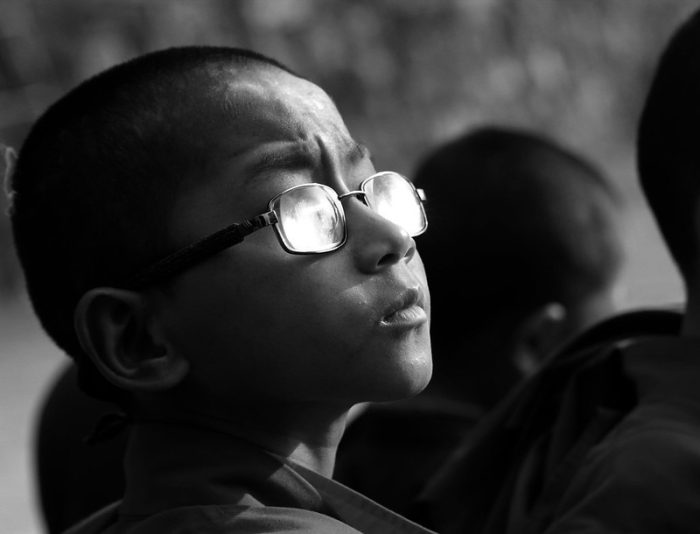A Rumi of One’s Own
I’ve always called him Rumi, but my Afghan student says he’s only
Balkhi, which makes me think of the 80s sitcom “Perfect Strangers,”
and I have a hard time imagining Bronson Pinchot’s bumbling
Balki Bartokomous—from the mythical Mypos—with the poise
and self-possession of a Sufi master. Call it a failure of imagination
on my part, even if Mevlana did sprinkle some Greek into his poems.
Tripe, he called his poetry. A messy business, selfless, prepared for friends.
He soiled his own hands to help us polish the mirrors of our souls.
I once watched Robert Bly dance his hands—fingers on the pulse of a poem—
deliver the psychic, secret souffles that no cold stethoscope
could ever detect, because here the heart must hear its own inheritance.
The lines fleeted forth in a limpid shimmer, carried by an incog current.
John the Baptist didn’t exactly know what was coming for him when Salome stepped in,
but Rumi’s teacher, Shams of Tabriz, said he would have given his own head
to be with someone who could endure his company. And who wouldn’t?
The space we share with another reminds us of how much we are the same.
After Shams disappeared, Rumi searched everywhere until, exhausted, he found him
in the very place he first met him—inside his heart.
“Out beyond ideas of wrongdoing and rightdoing there is a field. I’ll meet you there,”
they heard him say. Mine, yours—let them to the wind, like trackless birds.
One day when you are thin and long-shadowed and they ask you to
identify yourself, pull out your mirror, hold it up to your face and say,
“Yes, that’s us all right.”
~
~
Still Life with Watermelon
I.
What once was now is
something different and the same.
“No abstractions! No dull philosophizing!” you say. Ok.
Half a red watermelon sits to the side while
a pile of segmented rinds lies
on the cutting board.
Left with only the faintest memory of consumption,
I wonder if we’re anywhere when we’re not here.
Melon water and flesh,
And a trickle down the chin.
Simultaneous evaporation and absorption
as Tajin litters the sink like constellated glitter.
A quick rinse reveals the stark porcelain,
Effacing any trace of indulgence or impropriety—
ritual destruction.
A curious celebration, this flesh meeting flesh;
becoming flesh.
And the flesh was made flesh.
Flash of memory and moment.
II.
I’ve heard about the Tibetans and their colored sand.
Geometric patterns and sacred symbols,
or maybe just something to bide the time.
I wonder what they would make of this hoary lump.
I wonder what I could.
It’s not all sweet, but we work our way through
pith and rind.
Not where the meat is, but the ground of real learning.
If you swallow these seeds, no problem,
that’s what they’re there for.
They need more than water, but that’s a good start.
And here we are again,
Half a watermelon left.
Hey! There’s still life!
~
~
Monk in a Big Box
It’s Saturday morning and I’m trailing behind a Tibetan monk
pushing a cart through Costco, riding wave after wave
of samsara. I was going to say “his” cart, but I’m not sure how
attached he is to it. I did notice, though, the way he
inspected a shirt, held it up in front of him, then with a lazy
and, quite frankly, sloppy fold, dropped it back into
a pile of a hundred or so more that looked just like it.
Was he really paying attention? I tried not to judge him
too harshly. He, unlike me, probably never worked retail.
He was probably too busy fleeing Tibet, making his way
to India, settling in, memorizing passages, meditating, sitting
at the feet of Masters, reciting the Heart Sutra, holding
out his bowl for whatever someone dropped into it;
studying for his exams, debating his fellow monks,
on his way to becoming a Geshe, to be recognized by the Dalai Lama,
a degree conferred, a destiny ordained. Later, sent to the West
to enlighten those who, by accident, were of occidental birth.
Was it an accident? They (and by they I mean the Tibetans)
say we’ve all been each other’s mother at some point—maybe
countless times—so we should treat others accordingly.
But I doubt most of them grew up with Mommy Dearest or Jocasta,
And shouldn’t that also mean that others should treat me
as their mother? Don’t I, like Rodney Dangergield, deserve a little respect?
But how could they, if there is in fact no “I,” no “self”?
With more pressing concerns, I wandered off to the wine,
but I was left wondering—was this monk, garbed
as he was in maroon and saffron, loving his Chinese oppressors
by buying their cheap wares, these wares hawked
by Americans, who think they are happy to have cheap shirts
but are afraid when balloon sizes go from “party” to “spy”?
Ah! Interdependence, they might say. Because without samsara,
nirvana is a fantasy. And without Amazon Prime,
I can’t get a pair of shoelaces delivered to my doorstep
in a matter of hours. So what ties us all together?
I went home and sat with that, noticing the breath going
in and out, like a needle stitching and weaving
together this fabric of emptiness and compassion,
these two wings of the dove, and asked myself:
Is this the way the self ends?
Not with a bang, but with a breath?
~
Please consider Boosting our authors’ articles in their first week to help them win Elephant’s Ecosystem so they can get paid and write more.
~












Read 0 comments and reply